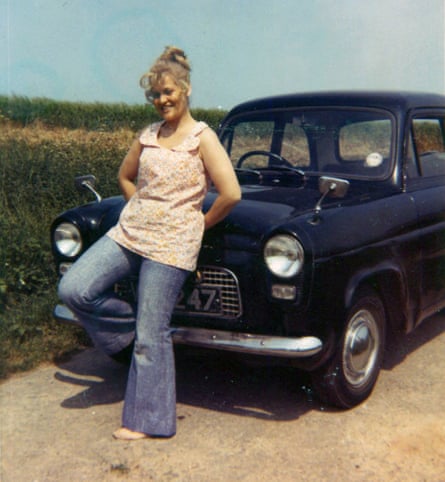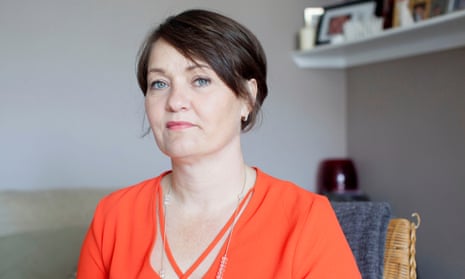“Sit down, Susan,” said my father. “I’ve got something to tell you.” I sat down, nervously smoothing my skirt down as best I could, and waited to hear the words that would change me for ever.
“Marie isn’t your mother,” he said, staring at the floor. “Jennifer is.”
I slowly digested the news: Jennifer, my older, glamorous, sister who flitted in and out of my life periodically, was actually my mum.
But, rather than burst into tears, I lifted my seven-year-old face to look at the man who had been a father to me all my life and smiled. It was as if all my Christmasses had come at once.
The smile was one of relief and excitement. Relief as Marie, the woman I had believed to be my mother, had left my father in 1974 when I was four and a half. I had spent six months crying myself to sleep and wondering why she had taken my sister Sharon with her, but left me behind.
Now, when I imagined my future, I was beside myself with joy; at seven years old and living with a father who, in his 50s, was so much older than any of my friends’ dads, I’d felt the absence of a mother keenly. With no one to show me how to do my hair, I was always the messiest in the class and – although my father tried his best – I was always the one who showed up to home economics with ingredients stuffed into a plastic bag, rather than the neat baskets the other girls had.
With high hopes, I left my London house with Dad that memorable weekend in 1977 and travelled to Margate where Jennifer lived. There, I met my two younger siblings, Jenny and Robert – proper children with whom I could run and play and whoop on the beach; previously, all my apparent “siblings” had been grown-up.
Seeing Jennifer and knowing she was my birth mum was incredible; I remember feeling close to tears as she drew a brush through my hair. “We’re like a real family,” I thought. My future stretched before me, full of mother-daughter moments: baking cakes, trying on clothes, sharing secrets. The only blot on the horizon was the moment I realised my father couldn’t really be my dad. “If you’re Jennifer’s daddy,” I remember saying, “you can’t be my daddy too.”
But in his capable and reassuring way, my father explained that, although he wasn’t my birth father – in fact, by blood, he was my grandfather – he had adopted me when Jennifer had asked him to look after me as a baby. I later discovered that she had been scared for my safety – we had lived for the first six weeks of my life in a small bedsit in south London, but Mum had found that the neighbour who cared for me while she was at work had been trying to sell me. With nowhere else to go, she had rushed to her father, who had offered to take me on one condition: he and his third wife, Marie – who, despite both having children with other partners, had been unable to conceive together – could adopt me; the arrangement that my mum hoped would be temporary was made permanent.

Looking back, this may have been a blessing. My father – or grandfather – became the stable presence in my life: the glue that held my existence together. I don’t think he had so much as boiled a kettle before he and Marie split up, but he grew to be an amazing father – telling me I could be anything I wanted to be and enduring summer holidays at Butlin’s holiday parks (which he hated) just to see me smile.
And while I longed in my heart for my mother, I now realise I was an anomaly – Jennifer had left four children behind when she left her first husband, Ron, in 1970 and went on to conceive two more children with her next husband. I was the child in between – the fatherless baby who didn’t belong.
Even so, when I cradled my newborn son in my arms in 1990, at just 20 years old, and felt overwhelmed with fierce, protective love, I was newly heartbroken at the thought of my mother giving me up – whatever the circumstances. Despite my hopes, the relationship I longed for with Jennifer never materialised. She would breeze into my life once every few months, and disappear again. And, as a child, and in the days before the technology we now take for granted, I had no power over whether I saw her or not. Despite the fact I had a mum, there was no one to mother me in a real sense.
My preteen years were fraught – and although my father did the best he could, when I began to rebel at 13 he couldn’t cope with my adolescent mood swings and emerging confusion about my situation. He contacted Marie, who agreed to take over my care.
When I think back to myself at 13, I am amazed at my relentless optimism in the face of back-to-back rejection – rather than feeling bereft, I was thrilled that I would have a mother again and could hardly wait to move from our home in Northamptonshire to Marie’s house in London.
But having had no contact with Marie for nine years, things weren’t at all as I had imagined: she was angry that I had been told about my birth mother, and seemed almost indifferent to me. Then in the typical pattern of my childhood, things changed again: at 15, I came home from a holiday to find the chain across the door. Marie, clearly upset, told me I should go to my father’s – her husband had left and she couldn’t look after me. Luckily, as always, my father welcomed me with open arms.
My desire to be part of a family continued into adulthood – I married Hugh in 1990, when I was 20, and we were blessed with three children: Liam, now 27, Katie, 24, and Aiden, 22. But family life, to me, was still a fantasy, trust was hard to establish and I struggled to find happiness. “All you’ve ever wanted is a family,” I remember Hugo yelling at me once during an argument, “and now you have it, you have absolutely no idea what to do with it!” We divorced in 1998, but remarried in 2009; now, at last I have my happy ending.
As for my mother? She used to ring me periodically – often drunk – to tell me she loved me. We even met for a drink from time to time. But when my father was dying in 2010 and she didn’t come to see him, we lost contact. Somehow her rejection of him was harder to bear than all the times she had let me down.
It was only in 2016 when I heard she had terminal cancer that I tried to re-establish contact. And, despite my fears, when I turned up at the hospital she talked to me as if we had never been apart. Being there at the end of someone’s life is a privilege, and I was the one holding my mum’s hand as she died. I avoided asking questions and instead just enjoyed our time together; and found that giving her peace helped me to find it myself.
Despite our chequered history, I am so glad we bonded in those final days. My mother may not have always been there for me but I am in no doubt that I was loved.
